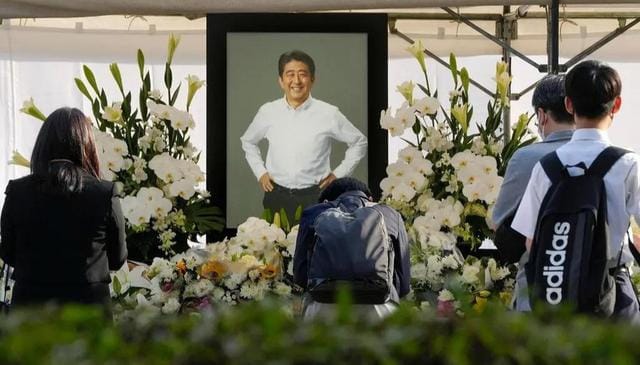What is the controversy over Japan’s former Prime Minister Shinzo Abe’s state funeral?
Japan has witnessed protests in several regions as the government is scheduled to hold slain PM Shinzo Abe’s state funeral on September 27.

The impending state funeral for Japan’s former Prime Minister Shinzo Abe has stirred major controversy in the country. The country has witnessed protests in several regions as the government is scheduled to hold Abe’s state funeral on September 27. Meanwhile, an elderly man set himself on fire near the Japanese Prime Minister’s Office on Wednesday, protesting against Abe’s state funeral. “Personally, I am absolutely against Abe’s funeral,” read a note found with the man, Kyodo news reported.
Why the controversy over state funeral?
According to reports, the expenditure for Abe’s funeral is expected to be around 1.7 billion yen (approx $12 million). This has outraged people in the country because they believe that the money could be used somewhere else as the country is heavily indebted. Earlier this month, Japan’s chief cabinet secretary Hirokazu Matsuno announced the anticipated expenditure for the funeral, which also covers security and reception expenses. Around 6,400 people are expected to attend the state funeral at the Nippon Budokan in the heart of Tokyo, including dignitaries from more than 190 nations.
Meanwhile, Japanese Prime Minister Fumio Kishida has stated that attendees will include high-profile dignitaries like Prime Minister Narendra Modi, US Vice President Kamala Harris, Australian Prime Minister Anthony Albanese and several others. In Japan, funerals for former and sitting Prime Ministers were generally hosted jointly by the government and the political party with which the deceased was associated too. However, Abe’s funeral will be held by the state, which means it will be totally funded by the national budget.
Why the state funeral for Shinzo Abe?
In the post-war period, Japan has accorded a state funeral only to former Prime Minister Shigeru Yoshida in 1967. According to the Japanese government, the state funeral has been planned for Abe because he was the longest-serving prime minister and its most well-known politician both domestically as well as globally. Prime Minister Fumio Kishida argued that the state funeral will enable world leaders to send their condolences and also demonstrate that “Japan will not give up to violence.” Meanwhile, a Yomiuri Shimbun poll conducted in early September revealed a decline in support for holding Abe’s state funeral, with 56% of respondents opposing the idea – an increase of 10% from August, the Japan Times reported.
Abe was assassinated on July 8
It is pertinent to mention here that Japan’s former Prime Minister Abe was assassinated on July 8. A gunman opened fire on Abe from behind while he was delivering a campaign speech on a street in Japan’s Nara prefecture. Following the incident, he was airlifted to a nearby hospital where he later succumbed to his injuries. Several leaders across the world paid their condolences to Japan and to Abe’s family following the tragic incident. In a statement, Indian Prime Minister Narendra Modi along with US President Joe Biden and Australian Prime Minister Anthony Albanese hailed Abe as a “transformative leader.”



